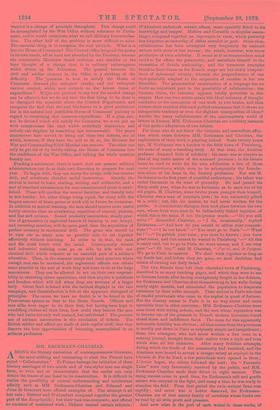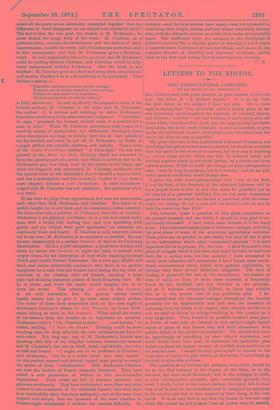MM. ERCKMANN-CHATRIAN.
AMONG the literary curiosities of contemporaneous literature, the most striking and interesting is what the French have styled "Collaboration." To France belongs the initiation of these literary marriages of two minds and of two styles into one single form, so even and so characteristic that the reader can only detect the traces of one hand in its construction. It is difficult to realise the possibility of mutual understanding and intellectual affinity such as MM. Erckmann-Chatrian and Edmond and Jules de Groucourt have offered examples of. The attempt is all but vain ; Diderot and D'Alembert composed together the greater part of the Encyclopidie ; but their task was composite, and offered no masion of combined work ; Diderot treated certain subjects;
D'Alembert undertook certain others, more specially fitted to his knowledge and temper. Moliere and Corneille (a singular assem- blage) composed together an impromptu in verse, which posterity has forgotten as unworthy of either moralist or poet. Since then,. collaboration has been attempted very frequently by eminent writers with more or less success ; the result, however, was never productive of twin celebrity. It seems as if no transcendent mind could so far • efface his personality, and assimilate himself to the- necessities of double authorship ; and the numerous examples- found in these times on the French stage are but sickly composi- tions of ephemeral vitality, wherein the preponderance of one- style painfully adapted to the exigencies of another is but too detectible. The grammatical construction of a language has no doubt an important part in the possibility of collaboration ; the- German idiom, for instance, appears totally powerless in this. respect. How can two artists attain this ideal intimacy of thought conducive to the conception of one work in two brains, and then retracetheir creation with such perfect consonance that it shows no antagonistic tendency or even the slightest transposition of ideas? Amidst the many collaborateurs of the contemporary world of letters in France, MM. Erckmann-Chatrian are a solitary instance- of this perfect adaptation of two talents.
For those who do not know the intimate and marvellous affec- tion which exists between MM. Erckmann and Chatrian, the. explanation of their work is puzzling indeed. Some twenty years. ago, M. Erckmann was a teacher in the little town of Phalsburg, the scene of many a touching story. At that time, the Alsatiaa. professor dreamed little of celebrity ; his name was as obscure as. that of any rustic native of the annexed province ; in his leisure hours he used to write for his own edification a few of those- conte.s fantastiques, which were to be subsequently the founda- tion-stone of his fame in the literary profession. Nor was M.. Erckmann in the first years of youthful enthusiasm ; his talent was. rather Germanic in its want of precocity. He had passed his thirty-sixth year, when he was so fortunate as to meet one of his old pupils, M. Chatrian, some twelve years younger than himself. Chatrian was a man of exquisite taste ; he was eminently gifted as a critic ; but, like his master, he had never written for the- public. A characteristic dialogue then took place between the two men, whose lives were soon to be indissolubly linked together, of which this is the tenor, if not the precise words :—" Do you still write ?" demanded Chatrian. —" I do, occasionally," replied Erckmann.—" And how do you intend to utilise your composi- tions? "—"I do not know."—" You must go to Paris."—" What for? "—" To publish your tales ; you mast be known ; you have great talent, and this cannot be wasted in Phalsburg."—" All this. iseasily said, but to go to Paris we want money, and I am very poor."—" Eh hien!" said M. Chatrian, ".Pen ai, moi, de l'argent._ We go to Paris to-morrow. We shall work together so tong as. my funds last, and before they are gone, we shall doubtless find- means of earning our daily bread."
The two friends then left their cherished town of Phalsburg, described in so many touching pages, and which they were to see- in German hands, after having courageously fought in her defence, for Erckmann and Chatrian shut themselves up in her walls during nearly eight months, and stimulated the population to desperate resistance by their noble example. Their arrival in Paris was that of candid provincials who came to the capital in quest of fortune. Bat the literary career in Paris is in no way easier and more- agreeable than in other countries ; MM. Erckmann-Chatrian were- soon beset with trying ordeals, and the men whose reputation was. to become one of the greatest in French modern literature found- closed doors and indifferent faces. The cause for this apparently systematic hostility was obvious ; all that comes from the provinces. isusually put down in Paris as helplessly simple and insignificant; these two strangers, who had never written a line even in a country journal, brought from their native town a style and tone which were all but unknown. After many fruitless attempts, during which the funds of the community had vanished, and the Alsatians were bound to accept a meagre salary as employes in the Chemin de Per du Nord, a few periodicals were opened to them ; L'Artiste began, the others followed the lead ; the "Fantastic Tales" were very favourably received by the public, and Mikt Erckmann-Chatrian made their debut in right earnest. This rising success came in good time, for Erckmann's soft and gentle nature was unequal to the fight, and many a time he was ready to abandon the field. From that period the twin-writers' fame rose rapidly ; and never was it better deserved, for Erckmann- Chatrian are of that scanty family of novelists whose books can be read by all with profit and pleasure. And now what is the part of each writei in these works, of which all the parts are so admirably cemented together that the difference of hand disappears in one limpid and inimitable style ? The fact is that the real poet, the creator, is M. Erekmann ; he alone shapes the rough body of the work ; M. Chatrian, as a judicious critic, corrects the exuberances and the defects of hasty improvisation, moulds the story, and eliminates the parts that seem to him unnecessary; and then M. Erckmann gives a finishing- touch. So well organisedis this mod us operandi, that M. Erckmann could do nothing without Chatrian, and Chatrian would be help- lessly embarrassed without Erckmann. But the work is not finished; M. Chatrian gives it a final and scrupulous examination, and decides whether it is in a fit condition to be published. Thus Boileau's maxim,—
Travaillez lentement at sans perdre courage, Toujoure ear Is metier remettez votre oavrage. Polissez-le sans cesse et le repoliasez Ajontez quelquefois et souvent effacez,"
is fully carried out. To sum up shortly the respective work of the 'brother-authors, M. Chatrian is the critic and M. Erckmann the author. It is curious and touching to notice Erckmann's 'boundless confidence in his collaborateur's judgment. "Chatrian," • he says, "possesses the keenest critical sense it is possible for a -man to have." When M. Chatrian pronounces such a part of a novel in course of construction not sufficiently developed, some other description too long, or decides that this or that episode is too far-fetched and must be cut off, M. Erckmann, as docile as • a pupil, strikes out, extends, shortens, and curtails. Thus a story -of the Conies Fantastiques entitled "A Cock-fight" (it was first printed in the Revue des Deux Mondes), which was intended to form the opening part of a novel, and which is entirely due to M. Erckmaan's pen, was being read by the author to his friend, and when the fragment was terminated, M. Chatrian exclaimed that the episode must be left untouched, that it formed a story in itself, and was a masterpiece ; and this is how Le Combat de Cogs, from a snore chapter, became a conte fantastigue. It must be acknow- ledged that M. Chatrian was not mistaken ; this particular story is a jewel.
If one were to judge from appearances, few men are more unlike -each other than MM. Erckmann and Chatrian. The latter is of middle height, he is very dark, and his complexion rather swarthy. He looks more like a portrait of Velasquez than like an Alsatian. Erckmann is his physical antithesis ; he is a tall and rather bulky man, with a broad, full, smiling face, and eyes sparkling with gaiety and joy behind their gold spectacles ; his manners are supremely frank and hearty. M. Chatrian is cold, reserved, almost icy in his way ; M. Erckmann is as expansive as possible. He may be seen occasionally in a certain brasserie of the rue du Faubourg Montmartre. He is a joyful companion, a great beer-drinker, and -when he leaves the brasserie at night his table is covered with -empty chopes, for his absorption of beer while smoking his large Dutch pipe recalls Tethers' Kermesses. He is ever gay, affable, and kind, and seems profoundly convinced that there is no greater happiness for a man who has worked hard during the day than to -converse in the evening with old friends, smoking a large pipe and drinking numerous glasses of fresh Strasburg beer. He is, in truth, just what the reader would imagine him to be from his works. This evening far niente in the brasserie is his only recreation, but the gravest events would hardly induce him to give it up when seven o'clock strikes. The writer of these lines remembers how, on the first night of Erckmann-Chatrian's drama Le Aar' Polonais, he found Erck- mann sitting as usual in the brasserie. When asked the reason of his absence from the theatre on so important an occasion,
Erckmann replied, "Oh, Chatrian is there? and besides," he added, smiling, "I know the drama." Nothing could be more touching than the deep affection the two collaborateurs have for -each other. Not long ago, one of M. Erckmann's friends was speaking with him of the singular variance between his manner and M. Chatrian's, the one so bluff, frank, and kindly, the other so stiff and formal. "I ought not to be preferred to Chatrian," said Erckmann, "for he is a much better man than myself." In this perfect concord and mutual regard must partly be sought the secret of their "collaboration." MM. Erckmann-Chatrian are now the leaders of French romantic literature. They have raised a new generation of writers in this much-invaded department. Their works are full of humane, patriotic, and generous sentiments. They have contributed more than any other writers to the overthrow of the militarist legend ; and their style is so wonderfully clear, free from ambiguity, and at the same time elegant and simpl4, that the ignorant of the rural districts in France might understand it without the smallest difficulty. No imitator—and the twin-writers have many—has yet succeeded in combining their simple, artless, and yet withal essentially literary tone, with the dramatic interest on which their works are invariably based. The unaffected style, the accuracy in the description of primitive country life, a singular power of drawing in a few words a comprehensive description of men and things, and above all, the complete absence of triviality and equivocal situations, entitle them to the first rank among French contemporary novelists.
C. B.



































 Previous page
Previous page